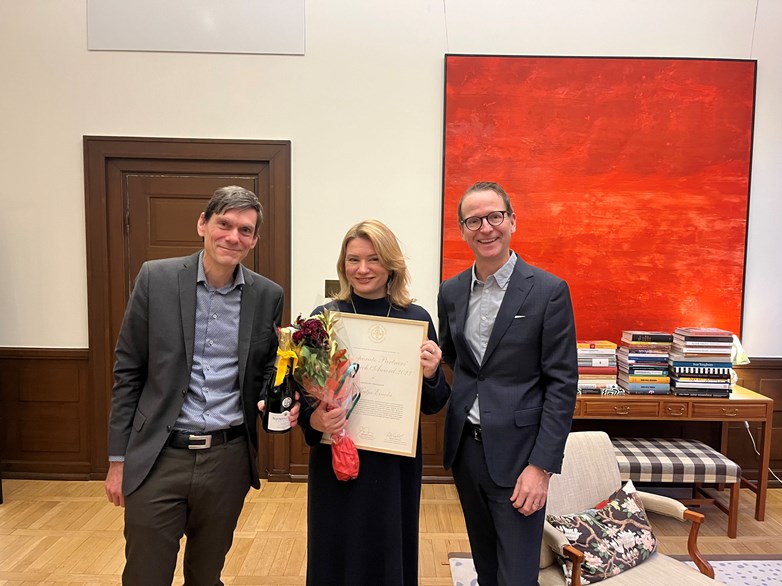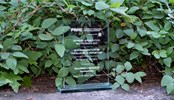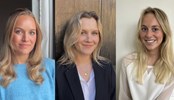Katja Einola receives the SSE Partners' Research Award
Congratulations! How does it feel to receive this award and how do you think it will affect your future research?
This type of acknowledgement makes a big difference. There is so much silent, lonely work when you conduct research, so many ups and downs and uncertainty. This is one profession where there are no guarantees that hard work will make you succeed in the end. It is a fantastic feeling that there is a community out there who thinks the work we do here as researchers and educators is important. The symbolic meaning of the award is huge. And I for sure am experiencing an energy boost!
What is the focus of your research, and who is you target audience?
Being a researcher and working in academia is my second career. I am focusing most of my research on the intersection of teamwork, leadership and digital technology, since they are subjects linked to my earlier work and I like doing research and teaching on subjects I have had hands-on experience of. I think this is where I can make the biggest difference. Bridging organizational life and reality, and what we do as academics is an area that needs more attention, in my opinion.
I have many research collaborations with businesses as well, so I like to work tightly and in dialogue with organizations where I do research. Also having some background in the consulting business, I have discovered that being an independent researcher without any commercial incentive or contractual ties with companies is a huge plus as what I discover, and share with them is without monetary interest. My research collaborators tend to be quite trusting and open, which also helps boost credibility of the research material I collect.
What excites you about your work and research?
I must say that I like my academic freedom. Here, in Sweden and at SSE I can freely choose what my research interests are, who I choose to collaborate with, what I teach and how. This is not a given everywhere. I will do what I can to foster an open and constructive communication culture and a truly diverse research agenda that emerges from collaborations and respect towards each other and not from any interest group’s top-down agenda.
As someone for whom this is a second career, I am most grateful that I have been offered the opportunities and trust here to do this work despite not being a Swede, being a career switcher in mid-life and having a non-traditional career path.
How would you describe your research methodology and teaching?
Most my research is exploratory and qualitative, but I am also an engaged in quantitative work. I think we as researchers should consider methods as our toolbox and not profile ourselves strictly in any camp. It is absurd in my view to argue which method is best – it all depends on the problem at hand! I have worked with Agile methods as a project manager long time ago. Some of my students in their course evaluations also efer to me as ‘an agile teacher’. I think this is how I see myself, too, also as a researcher. Agile and improvisational. An experiences craftsperson and coach rather than a lecturer and a scholar.
What are your career goals and aspirations?
I simply want to keep on doing what I am doing now, gradually building on my work so far. As someone with an international career behind her, I also want to strengthen SSE’s international ties and in particular those between Nordic countries. We have many strengths as a culture that are reflected in the success of our societies and businesses. We could articulate and show this much more. When I lived in Canada and studied at HEC Montreal, many faculty members praised the ‘Nordic tradition of management’. I think we could further articulate what makes us a special region before losing our traditions and ways of organizing as we adopt management and leadership fads that are popular elsewhere. I do not mean all of this is bad, simply that we could be more critical of what wisdom we receive and reflective about the methods and theories we adopt and apply. I’d like for us keep building on our strengths with more self-confidence and without feeling that we always need to imitate others.
Jury's motivation
After a decade long international career in business, Katja Einola started her doctoral studies in 2014 and received her PhD in 2017. She has since then shown a remarkable productivity for an early-stage researcher, publishing impactful works multiple times in the top international journals in each of her topic areas: organization studies, leadership, and HRM. Her work on team dynamics elucidates the sense-making processes in the making and unmaking of teams. She has also questioned the fundamental assumptions supporting ‘authentic leadership’, thereby contributing to a vivid conversation on ‘positive’ leadership. In addition, Katja Einola has demonstrated her capacity to link theoretical and practical challenges and to apply these skills in her research collaboration with practitioners as well as with SSE students at various levels. Together, these achievements makes her a well-deserving recipient of the 2023 SSE Partners’ Research Award with a potential to become an impactful international scholar in the future.




